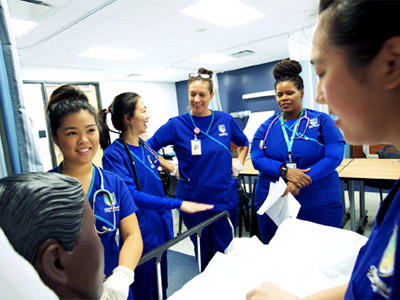Featured
Tags
Share

Tracy Heberlig, MSN, RN, discovered nursing by accident.
“Ever since I was young, I wanted to be a teacher,” she said. “After working as an elementary school secretary, I started looking into continuing my education but was undecided on what type of educator I wanted to be. While in college, my instructors encouraged me to consider nursing, and I fell in love with the profession.”
Tracy eventually married her two passions and became a nurse educator. Today she is the SIMCARE CENTER™ manager at Chamberlain College of Nursing’s Charlotte campus, helping students develop and apply their clinical knowledge in simulated medical situations with lifelike mannequin patients.
“Working with students means you have to be prepared for anything, which I love,” said Tracy. “In the SIMCARE CENTER, our students have a safe place to learn. We know they’re going to make mistakes, but we want to help them learn from those mistakes. We call that ‘falling forward.’”
Chamberlain students know how valuable the SIMCARE CENTER can be to their education. They see the real-time impact of their actions as their ‘patient’ responds to their treatment and care.
In one new SIMCARE scenario, Tracy and Chamberlain faculty are enhancing students’ pathophysiology course experience, where they learn about diseases of the body in the simulation lab. Tracy and her staff use the SIMCARE equipment to simulate abnormal heart or lung sounds, so students can assess and respond in real time and more easily retain the information.
“Making learning active helps students not just memorize but understand their clinical education,” said Tracy. “This is one of the things I love about what we can do in the SIMCARE lab.”
Breakdowns in communication in the healthcare setting can adversely impact patient outcomes, so Tracy and her team emphasize the importance of communicating in the SIMCARE CENTER in addition to learning nursing skills. The lab’s collaborative environment helps students communicate with faculty, their fellow students and the patient in both clinical simulation lab experiences.
Through interactive debriefing sessions, Tracy, along with the SIMCARE CENTER faculty, help students evaluate their experiences. In these sessions, they talk about what worked and what didn’t and address students’ feelings in the process, which encourages improvement of their skills and confidence.
“We want our students to reflect positively on their SIMCARE experiences and become extraordinary nurses,” said Tracy. “By teaching future nurses how to collaborate as a team to provide safe and complete person-centered care, we are transforming healthcare in our own communities and beyond.”
By Molly Mattison
More from Home
Request More Information
To receive the Chamberlain University Program Guide, including associated career paths, please select a program of study.






